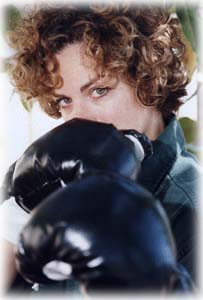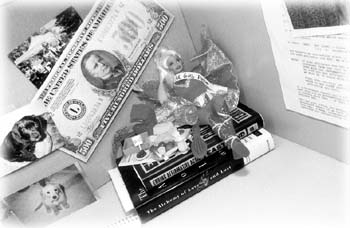![[MetroActive Features]](/gifs/feat468.gif)
![[MetroActive Features]](/gifs/feat468.gif)
[ Features Index | Sonoma County Independent | MetroActive Central | Archives ]
Putting the Nix on Radio
If sisterhood is so powerful, why is radio talk-show host Shann Nix one of the only airwave sisters with power?
By David Templeton
WITH her head wrapped in a turban of headphones and both hands on the gleaming control board before her, radio talk-show host Shann Nix aims her voice and attention at a tall, stainless steel, table-mounted microphone into which she vehemently--passionately-- argues with an unseen late-night opponent.
"That's all well and good, ma'am," she says curtly, her eyes fixed straight ahead on the reflective glass window that contains the darkened and vacant KGO news room. "That would be lovely! It would be wonderful if people waited until marriage to have sex. But the truth is, people don't! It would also be nice if there were no stupid people. Or no ugly people. It would be nice if there were no poverty, too, and no ignorance. But this is the real world, ma'am, and guess what? That just ain't the way it is. So let's work with what we've got instead of whining about what we'd like to have.
"Thanks for your call. Now let's hear from Jerry in San Jose. Jerry, you're on KGO with Shann."
During this fiery, 22-second retort--overheard by more than a million Bay Area insomniacs and graveyard-shift radio listeners--Nix successively acknowledges my presence with a welcoming wave; motions me to a seat across the control board from her; receives elaborate pantomimed instructions from producer Beth Rimby; looks up to check the clock (it is 11:55 p.m., five minutes till the midnight news break); and finally rolls her eyes in amazement and dismay at the sad simple-mindedness of people like "ma'am."
Next into the ring: poor, unsuspecting "Jerry in San Jose," who has called expecting Nix to affirm his decision to let his teenaged daughter entertain overnight boyfriends, "as long as her grades remain high." Nix demurs, and Jerry instead reels from a volley of aphoristic rabbit-punches that will result in a classic Nix knockout.
As the caller is being rendered retortless, I glance around the studio. It's a small place, crowded with high-tech accoutrements, but blessed with a massive window that exposes a mostly darkened San Francisco skyline and the even darker bay beyond.
In this room, I can almost feel the cast-off energies of other notable KGO celebrities--people like Bernie Ward, Ronn Owens, Dr. Dean Edell, Rich Walcoff, the long-since-defected Michael Krasny, and the late, great Duane Garrett--talented, sometimes irritating men who've sat in the very chair in which Nix now pivots, deftly pissing off some of the very same listeners.
WELCOME to the ferocious, gladitorial arena known as KGO NewsTalk (810-AM). It's a high-stakes player in a high-stakes industry; a statewide ratings giant, comfortably housed in the monolithic West Coast headquarters of the Walt Disneyowned American Broadcasting Co. Unlike mere music or news stations, news talk is a business that demands far more than articulation and velvet-voiced smoothness from its on-air performers; as demonstrated by the likes of liberal Tom Lykis, conservative Rush Limbaugh, and apolitical shock-jock Howard Stern, these performers are under a mandate to get people steamed, to go for the throat: in short, to get the damn phones ringing.
After three years in the business, the 30-year-old Nix is still considered the new kid on the talk radio block. Working hard to develop her taste for the raw jugular vein while honing her own style--passionate, edgy, defiant, sexy in an intimidating sort of way--Nix is winning fans and enemies across Northern California and beyond. This after having spent her 20s achieving a fairly high level of recognition as an undercover reporter for the San Francisco Chronicle, having become a well-reviewed novelist, and--most notoriously--as a much ballyhooed "expert" on the youthful Generation X, an expertise she now admits she offhandedly improvised, though she is credited with having coined the term.
Nothing she accomplished, however, prepared Nix for the knock-down-drag-out slings and arrows of this very public, very confrontational occupation.
A self-described "Southern belle"--she was born and raised in rural Texas, the daughter of media-spurning artists--Nix has had to learn to fight while attempting to carve her vocal signature on a medium long dominated by the voices and sensibilities of men.
This is an industry with static growth in the number of female talk hosts, newscasters, and commentators. A recent survey by the Radio-Television News Directors Association shows that women have held firm to a 31-35 percent share of the overall news radio workforce for several years in a row, making Nix's high visibility especially important. And then there's that other factor: At her tender age, Nix holds the distinction of being the youngest full-time, mainstream, female radio host in America.
AS THE MORNING co-host and news director of KPFA (94.1-FM) in Berkeley, Chris Welch has been prominent in Northern California's morning audio landscape for over a decade, though on a much smaller scale, in terms of listeners, than that of KGO.
"For a woman to be on the air at all on a station with as many listeners as KGO is, in itself, a somewhat political act," observes Welch. "If the voices of women and minorities are absent from the airwaves, then, obviously, we end up with only the white male perspective of the world.
"It is much richer to have a variety, and Shann Nix, if nothing else, is providing that woman's voice."
Declining to comment directly on Nix's abilities or viewpoint--the early-rising Welch is usually asleep by the time Nix's program begins--she admits that Shann Nix's name comes up not infrequently in conversation among her associates. "The general buzz is that, though she's not as politically savvy as she might be, she means well. And when the only women's voices you ever hear are those of people like Dr. Laura Shlessinger [syndicated nationally, the ultraconservative psychologist is also heard on KGO], it's good to have anyone who represents a more thoughtful perspective."
Radio host Michael Krasny, creator of KQED's (88.5-FM) cerebral morning program "Forum," suggests that, all hype aside, "There is an honesty about this business." Krasny should know, having left KGO--where he held the same 10 p.m. to 1 a.m. slot that Nix now occupies--in order to stretch his creative wings. A longtime acquaintance of Nix, he is reticent to offer any critique of her program, though he does have this to say in her support: "You can't fake honesty. If you are good at stirring people up, genuinely, you will last in this business. Nighttime, especially, tends to make for an intimate relationship between radio listeners and their host.
"As she develops her voice more and more, I think we can only expect to see her ratings grow."
And it does come down to ratings. Arbitron, the Maryland-based company that monitors ratings for radio and television programming around the country, reports that KGO's evening programming--constituting the back-to-back packaging of Nix and former priest Bernie "Lion of the Left" Ward (in the 7 to 10 p.m. slot)--is the top-rated station in Sonoma County for that time period, Monday through Friday. In San Francisco, the Ward-Nix package is ranked No. 3.
"Our ratings are good," says Beth Rimby, who produces and screens callers for both programs. "Shann is testing things out right now, she's playing a lot with the format. The station is happy with the show. And," she grins, "from a producer's end, this is a fun show to do. It's very high-energy."
HAVING BEEN RAISED in rural Texas, my upbringing does not suggest that I would end up doing what I do," Nix remarks after leaping up to stretch during the seven-minute national news break. "We Southern belles have a deep-seated horror of confrontation. Believe it or not, I was trained to make people feel happy."
Laughing at my expression of disbelief--after all, I've just watched her lend rope to a veritable parade of callers eager to hang themselves with her verbal assistance--she insists, "Really! I was always told that a good hostess avoids topics that create controversy--things like religion and politics. In my first year on the radio, I really had to struggle with this. I was appalled by the thought that, not only was there supposed to be confrontation on the show, but I was supposed to spark it!
"I used to call my mom up every night and cry, 'Mom! Everyone hates me!'"
Nix takes her break time to step outside for a breath of air, returning to the booth 90 seconds before she's back on the hot seat.
"When I came into this, I came in wanting to make everyone like me," she confesses, swiveling into her chair. "But I quickly realized that that would be really boring--no one wants to listen to that, and no matter what I said or did, half of the people were going to hate me anyway.
"That's the rule of radio: Half of the people are always going to hate you."
Slipping her headphones around her neck, she scans the computer screen. There are a number of calls already waiting.
"You know what?" she asks, pulling the headphones back over her ears for her final hour in the ring. "I don't mind it as much as I used to."
NIX LIVES just outside the town of Sonoma with her husband, Sam Nix-Davis (they each took one another's name; when not on the air she is introduced as Shann Nix-Davis). There she gardens, avoids reading newspapers on her days off, and spends her time writing. Though her radio work has given her a high degree of celebrity, Nix thinks of herself mainly as a writer.
Having studied under novelist Isabelle Allende at UC Berkeley, Nix was in her early 20s when she was hired by the San Francisco Chronicle. While there, she dabbled in undercover work, once posing as a freshly converted Moonie to investigate the cult's "indoctrination camps." Her impersonation of a San Francisco high school student for a series on safety conditions in the inner-city school system sparked a riot of controversy and ethical questions, while her ballsy crashing of Hugh Hefner's wedding only solidified her anything-goes reputation.
Her other mandate was to bring in young readers, and, as she once related to the Examiner magazine, "'To explore the hitherto unexplored land of young people, of deranged and depressed, melancholy but still strangely marketable, styles and attitudes.'" In short, Gen X.
Nix has an oft-derided skill at self-promotion, a talent she employed to propel herself onto numerous national talk shows to discuss the "Posties," the other name that she coined for the postbaby boom generation. It was all, she says, "a lot of bunk." Relentlessly pragmatic, Nix defends her role as the public definer of a generation that she now says cannot be defined by shrugging, "Hey, it was a gig."
Hosting a radio show was a fluke. While promoting her first novel--the mystically tinged, semi-autobiographical epic Wildcatting (Ballantine, 1993)--she was offered a fill-in position on KGO. The public relations people at the station were reportedly so taken by her attitude and pyrotechnic verbal ability while hawking her book that they told her, "You should have your own show."
Retained as an on-call substitute, Nix quickly gained fierce supporters--including the mentorship of legendary political commentator Duane Garrett--and at least as many critics. Listeners were appalled by her brash incitement of people to refrain from voting on the grounds that "it only encourages the politicians." (A passionately patriotic listener actually succeeded in changing Nix's mind on this issue, right on the air; in last November's election there was no fiercer supporter of the voting process than Nix.)
Listeners were also shocked by her suggestion that in wartime, the front lines should be staffed solely with women suffering from PMS, who would be rotated onto the lines "based on their level of crankiness."
In rapid succession, Nix gained her own regular weekend show on KGO, shaved her head, and bleached herself blond (fulfilling a promise to those listeners who pledged large sums at the station's annual leukemia fundraiser), then switched to sister station KSFO (1250-AM) for a short-lived, daily, noon-to-3 show called "The Naked Lunch."
A wild and loopy endeavor--that show included strange weekly segments phoned in from such elegant locales as pig farms--it was canceled without warning when the station was given over to a conservatives-only format. She returned to fill-in duties on KGO, entertained offers from other stations in the area, and waited for a full-time job.
Ironically, the opening came only after the 1995 suicide of Garrett. When Bernie Ward moved into Garrett's spot, suddenly, Nix had her own nightly show on the station that had given her her first break.
ON A BRIGHT, chilly afternoon, Nix sits far from her radio booth, stirring hot chocolate in a Petaluma cafe. "His death really shook me up," Nix says of Garrett. "Duane was so supportive of me, and his death made me very angry. He was a lovely guy."
She tells of the time Garrett, a literal heavyweight at over 300 pounds, came into the studio with a picnic basket during her first week of "The Naked Lunch," stripped to his underwear, and served her a meal as she sparred with callers.
"What's been happening lately, partly because of Duane, is that I feel I'm waking up. I'm growing up. I'm finally getting that this ... "she spreads her arms, "doesn't go on forever. What is really important to me right now is my writing and my family and my gardening."
She is at work on a second novel, though she writes, she says, more for pleasure than to produce publishable material. "Writing is my secret garden," she says. "It keeps me sane." That said, Nix admits that she'd someday like to take the insanity of her radio show nationwide. "There isn't a talk-show host alive who doesn't [want that]," she admits. "But I'm still learning what it is I do and how I do it. It would be nice, but I'm not hungry for it. That goal is a Holy Grail, way off in the future."
As one of the few women in America hosting the airwaves for so large an audience, Nix is aware that many pairs of eyes are watching her. To risk overstatement, the immediate future of women in radio--at least locally--may be affected by her performance.
"It's been a man's gig for so long," she sighs. "Probably because both men and women prefer to hear a man's voice on the radio. This is awful but true! It's part of our conditioning or something. Women will complain and say, 'How come there aren't more women on the air?' But at the same time, when I get attacked--I mean really viciously attacked, character assassination stuff--it is almost always by women."
She laughs. "When I came in to this I was expecting the whole sisterhood thing, women supporting women. On the other hand, I do make people mad. I make them nuts! So why should I expect women to keep calm just because I'm a woman, too, right?
"There is no road map to this job," she continues. "Part of the problem of being a woman in a man's field is that I know how Duane Garrett did it, I know how Bernie Ward does it, but I can't do it that way. I'm still in the process of figuring out what my voice is. What I'm trying is to find an issue to talk about that taps into a larger social issue. To make people think.
"I had a boss tell me once, 'Don't get too smooth. It's important that you are vulnerable, and that people experience you as a real person." Standing in preparation to leave the cafe, Nix scoops up her belongings and laughs.
"It's like taking your clothes off in Grand Central Station, and saying, 'Hey! Here I am. What do you think?'"
[ Sonoma County Independent | MetroActive Central | Archives ]
This page was designed and created by the Boulevards team.

Photos by Janet Orsi.

Desk Set: Nix's mementoes range from tomes on affirmative action to such all-girl radio concerns as Barbie, money, and puppy love.
From the April 24-30, 1997 issue of the Sonoma County Independent
Copyright © 1997 Metrosa, Inc.